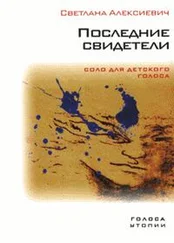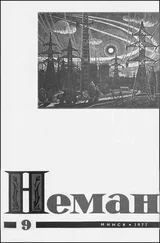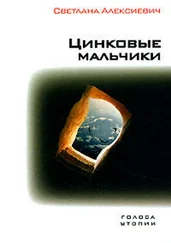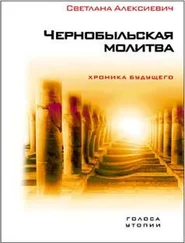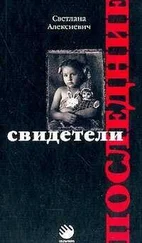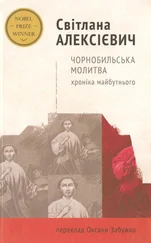Светлана Алексиевич - Chernobyl Prayer - A Chronicle of the Future
Здесь есть возможность читать онлайн «Светлана Алексиевич - Chernobyl Prayer - A Chronicle of the Future» весь текст электронной книги совершенно бесплатно (целиком полную версию без сокращений). В некоторых случаях можно слушать аудио, скачать через торрент в формате fb2 и присутствует краткое содержание. Год выпуска: 2016, ISBN: 2016, Издательство: Penguin Books Ltd, Жанр: Биографии и Мемуары, на английском языке. Описание произведения, (предисловие) а так же отзывы посетителей доступны на портале библиотеки ЛибКат.
- Название:Chernobyl Prayer: A Chronicle of the Future
- Автор:
- Издательство:Penguin Books Ltd
- Жанр:
- Год:2016
- ISBN:9780241270547
- Рейтинг книги:3 / 5. Голосов: 1
-
Избранное:Добавить в избранное
- Отзывы:
-
Ваша оценка:
- 60
- 1
- 2
- 3
- 4
- 5
Chernobyl Prayer: A Chronicle of the Future: краткое содержание, описание и аннотация
Предлагаем к чтению аннотацию, описание, краткое содержание или предисловие (зависит от того, что написал сам автор книги «Chernobyl Prayer: A Chronicle of the Future»). Если вы не нашли необходимую информацию о книге — напишите в комментариях, мы постараемся отыскать её.
Chernobyl Prayer: A Chronicle of the Future — читать онлайн бесплатно полную книгу (весь текст) целиком
Ниже представлен текст книги, разбитый по страницам. Система сохранения места последней прочитанной страницы, позволяет с удобством читать онлайн бесплатно книгу «Chernobyl Prayer: A Chronicle of the Future», без необходимости каждый раз заново искать на чём Вы остановились. Поставьте закладку, и сможете в любой момент перейти на страницу, на которой закончили чтение.
Интервал:
Закладка:
I was little. Eight years old.
Then it was spring. In the spring, leaves unfolded out of the buds like they always did. They were green. The apple trees blossomed. They were white. The cherry trees had the same fragrance. The daisies, they were the same as usual. Then we ran to the river to the anglers, to see if the roach still had heads and tails. And the pike. We checked the starlings’ nest boxes to see if they had flown back, and whether they would have babies.
We had a lot of work to do. We had so much to check.
The grown-ups were whispering. I could hear …
In the year I was born, 1986, there were no other boys or girls born in our village. I’m the only one. The doctors didn’t allow it. They frightened Mum. Something horrid … but my mum ran away from the clinic and hid with Grandma. And then there was me … just turned up … Well, was born, I mean. I overheard all that.
I have no little brother or sister, and I so want one. Where do children come from? I would go and look till I found my little brother myself.
Grandma keeps giving me different answers: ‘The stork brings them in its beak. Or sometimes a little girl grows in the fields. Little boys are found in berries, if a bird drops them.’
Mum told me something different. ‘You fell from heaven.’
‘How?’
‘It started raining, and you fell right into my arms.’
Miss, are you a writer? How could there not be a me? And where would I be? Somewhere high up in the sky? Or maybe on another planet?
I used to love going to exhibitions, looking at the pictures …
They brought an exhibition about Chernobyl to our town … a young colt is running through the forest, but he is all legs, eight or ten of them; a calf has three heads; bald rabbits sitting in a cage, looking as if they’re plastic. People walking through a meadow wearing spacesuits. Trees higher than churches, flowers as high as trees … I didn’t make it to the end. I came upon a photo of a boy stretching out his arms, perhaps for a dandelion, or perhaps to the sun, but instead of a nose he had something like an elephant’s trunk. I wanted to cry. I wanted to shout, ‘We don’t need exhibitions like this! Don’t bring them! Everybody around here is already talking about death. About the mutants. I don’t want any more!’ On the first day it opened, people came, but after that, not a single person. In Moscow and St Petersburg, they wrote all about it in the newspapers and crowds of people went to see it. In our town, the exhibition hall was empty.
I went to Austria for treatment. There are people there who can hang a picture like that up at home – a boy with a trunk, or flippers instead of hands – and look at it every day, in order not to forget about people in misfortune. But when you live here, it’s not a fantasy or art, it’s real life. My life … If I had the choice, I’d rather hang something pretty in my room. A beautiful landscape, where everything is normal, the trees, the birds. Ordinary. Cheerful …
I want to think about pretty things.
The first year after the accident …
All the sparrows in our village disappeared. They were lying all over the place, in gardens, on the tarmac. They got raked up and taken away in containers, along with the leaves. That year, you weren’t allowed to burn leaves. They were radioactive. They had to be buried.
Two years later, the sparrows reappeared. We were so pleased. We were shouting to each other, ‘I saw a sparrow yesterday. They’re back.’
The cockchafers vanished. They still haven’t come back. Perhaps they will in a hundred or a thousand years’ time, like our teacher says. Even I won’t see them, though I’m only nine.
And what about my grandma? She’s very old.
On 1 September, starting school again …
There wasn’t a single bunch of flowers. We knew by then there was a lot of radiation in flowers. Before school started, it wasn’t carpenters and painters working like it used to be, it was soldiers. They scythed down the flowers, stripped off the soil and took it away somewhere in trucks with trailers. They cut down a big, ancient park, the old lime trees. Old Nadya – she was always called to the house when someone died, to do the keening and say the prayers – said, ‘’Twas not the lightning struck you … Not the drought that brought you low … The sea did not flood you … Yet there you lie like coffins black.’ She mourned the trees as if they were human beings. ‘Alas, my oak tree, my apple tree, gone …’
A year later, we were all evacuated and they buried the village. My dad is a driver. He took me there, and told me about it. First, they dug a deep pit, five metres deep … Then the firemen came with their fire engine and hosed a house down, from the roof ridge to the foundations, so as not to raise radioactive dust. The windows, the roof, the doorway, they washed everything. Then a crane lifted the house up and put it in the pit. Dolls, books, jars everywhere. The digger scooped them up, covered everything with sand and clay and firmed it all down. Where the village had been was just a flat field. Our house was under it, and the school, and the village soviet. My dried-flower collection and two stamp albums. I so wanted to take them with me.
I had a bike. My parents had just bought it for me.
I’m twelve …
I’m at home all the time, an invalid. In our house, the postman brings a pension for my grandad and one for me. When the girls in my class learned I had leukaemia, they were afraid to sit next to me or touch me. I would look at my hands, my school bag and exercise book. Nothing had changed. Why were they afraid of me?
The doctors said I was ill because my dad had worked at Chernobyl. I was born after that.
But I love my dad.
I had never seen so many soldiers …
They washed down the trees, the houses and roofs. They washed down the collective farm’s cows. I thought, ‘Poor forest animals. Nobody washes them down. They will all die. Nobody washes the forest down. It will die too.’
Our teacher said, ‘Draw radiation.’ I drew it raining yellow rain, and a red river flowing.
From childhood, I loved technology …
I dreamed that, when I grew up, I would work in something technical. My father loved technology. He and I were forever designing something. Constructing.
My dad went away. I didn’t hear him leaving. I was asleep. In the morning, I saw Mum all tear-stained. She said, ‘Your father is at Chernobyl.’
We waited for Dad to come back, as if he was away in the war.
He came back and went to work at his factory again. He didn’t tell me anything. At school, I was boasting to everybody that my dad had come back from Chernobyl; he was a member of the clean-up team, and the clean-up workers were the ones who helped to overcome the accident. Heroes! The other boys envied me.
A year later, Dad became ill …
We were walking round the park at the hospital. That was after his second operation. It was the first time he talked to me about Chernobyl.
They were working quite near the reactor. It was as quiet as could be, he said, and beautiful. All sorts of things were happening. Orchards were blossoming, but who for? The people were gone from the villages. They drove through Pripyat. There was washing hanging on the balconies, pots of flowers. A bicycle had been left under a bush with a postman’s canvas bag full of newspapers and letters. A bird had nested on it. I saw it all, as if it was a film …
They ‘decontaminated’ things that just needed to be abandoned. They stripped away topsoil poisoned with caesium and strontium, and by the next day it was clicking on the meters all over again.
‘When we left, we got a handshake and a certificate of commendation for our selfless work.’ My dad reminisced and reminisced. The last time he came out of hospital he told us: ‘If I stay alive, I want nothing to do with physics or chemistry. I’ll retire from the factory and be a shepherd.’
Читать дальшеИнтервал:
Закладка:
Похожие книги на «Chernobyl Prayer: A Chronicle of the Future»
Представляем Вашему вниманию похожие книги на «Chernobyl Prayer: A Chronicle of the Future» списком для выбора. Мы отобрали схожую по названию и смыслу литературу в надежде предоставить читателям больше вариантов отыскать новые, интересные, ещё непрочитанные произведения.
Обсуждение, отзывы о книге «Chernobyl Prayer: A Chronicle of the Future» и просто собственные мнения читателей. Оставьте ваши комментарии, напишите, что Вы думаете о произведении, его смысле или главных героях. Укажите что конкретно понравилось, а что нет, и почему Вы так считаете.

